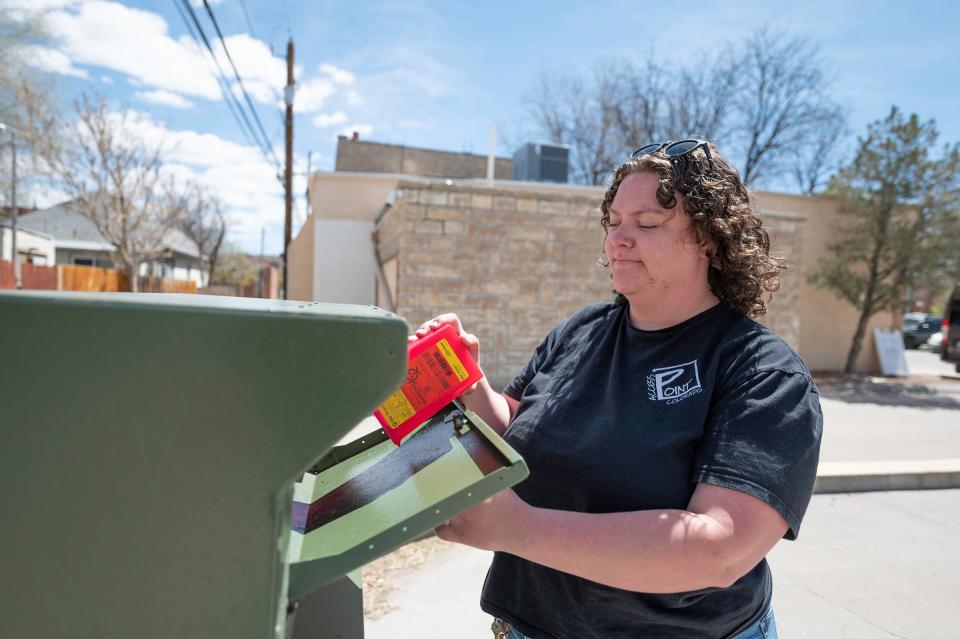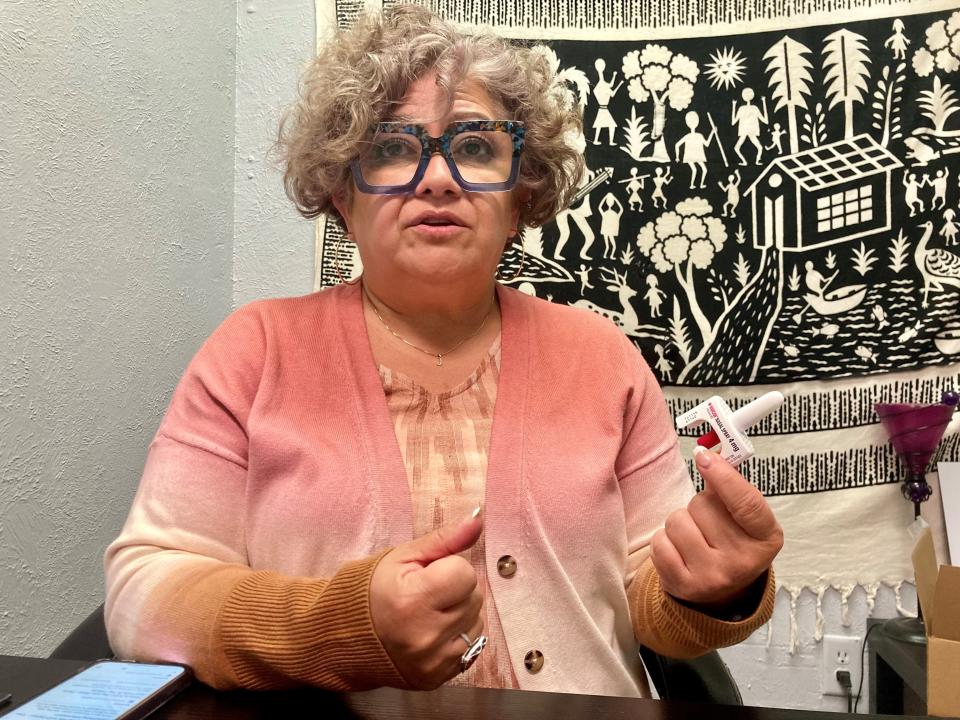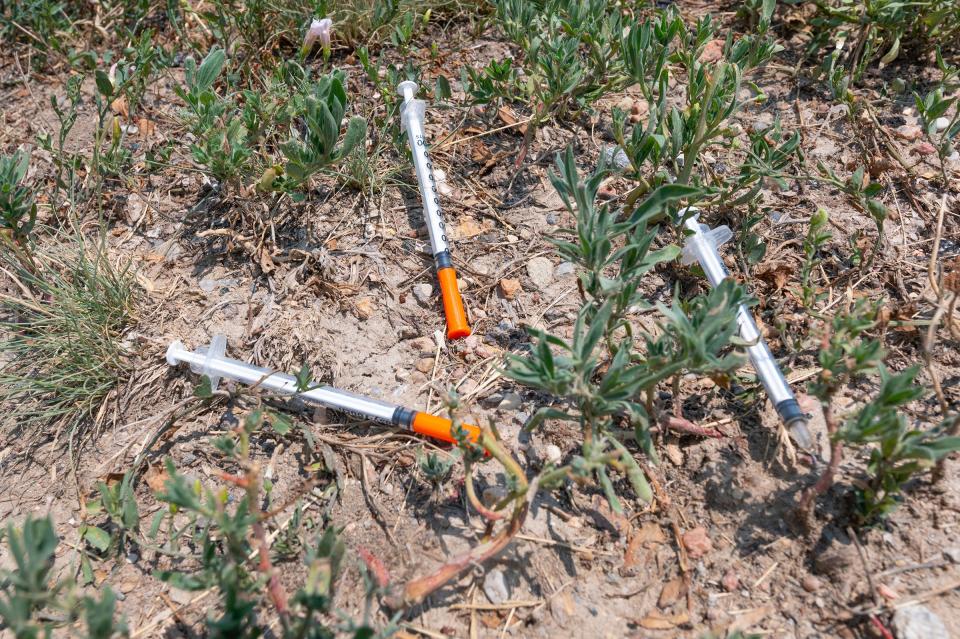Pueblo harm reduction experts say needle exchange ban would 'lead to a lot more needles'
Pueblo City Council is scheduled to vote Monday evening on a controversial ordinance to ban syringe exchanges within city limits.
The ordinance includes several talking points of local politicians who have been critical of the programs, including that needle exchange programs lead to an increased prevalence of needles in public places.
The rhetoric in the ordinance contains inaccurate information and makes assertions refuted by decades of scientific research, leaders of Pueblo's needle exchange programs told the Chieftain.

What the ordinance says
The ordinance bans needle exchange services within the city of Pueblo and includes a preamble with several paragraphs decrying syringe exchange programs and the prevalence of needles around town.
“The operation of needle exchanges increases the risk of overdose and death by facilitating the use of deadly and dangerous synthetic opioids, which are difficult to detect by drug users leading to the unknowing use of drugs containing fentanyl,” the ordinance states.
Creating, administering and participating in a syringe exchange program would be considered a nuisance under the same section of city code that regulates “offenses against property.”
If the ordinance passes, operating and participating in a syringe exchange program would join other property offenses such as accumulating stinky piles of “manure, feces or other organic matter,” barbed wire in residential neighborhoods, and most instances of keeping wild animals.
Nuisances are considered Class 2 municipal offenses, but a “habitual offender” with two or more offenses within a five-year period could receive a jail sentence of up to 364 days, City Attorney Carla Sikes said to city council when they passed the ordinance on first reading in late April.
The ordinance also states that more needles and drug paraphernalia are being found in public areas and parks but does not directly cite any data to support that claim.
The official city document also does not mention any potential benefits of syringe exchange programs — backed by several decades of scientific research — such as reducing the prevalence of diseases that can be spread when sharing needles and increasing the likelihood that participants will seek substance abuse treatment.
How the ordinance was written
It is unclear how city staff wrote the ordinance or what data they are referencing. A city spokesperson declined the Chieftain’s request for an interview with the author.
“We won’t be making anyone within the law office available prior to the ordinance having second reading on Monday,” City Spokesperson Haley Sue Robinson said in a text message.
Robinson added that Roger Gomez, the District 4 councilor who introduced the measure, could address “his work on the ordinance.”
Gomez did not respond to multiple requests for comment.
What local harm reduction administrators say
Jude Solano, the co-founder and CEO of the Southern Colorado Harm Reduction Association, questioned the accuracy of some of the assertions in the ordinance.
“It is disinformation that they're spreading to the community on a platform that is pretty powerful,” Solano said. “They have a say — people believe them and they should be held accountable for spreading that information that's inaccurate.”

One study published in 2019 by a macroeconomist at Vanderbilt University concluded that needle exchange programs can lead to higher rates of fatal opioid overdoses, but also noted that syringe access programs can reduce the prevalence of HIV.
But other research and local data suggest that these programs, especially when paired with overdose-preventing drug distribution, can reduce the risk of drug overdose deaths.
Every month, both of Pueblo’s needle exchange programs give out hundreds or thousands of doses of naloxone, commonly known as Narcan, which is a medication that can reverse opioid overdoses.
“What we can see with the data on a local level is that community access to Naloxone and the access to Naloxone for people who use drugs and inject drugs has really, really helped the Pueblo community to curb the amount of deaths that have happened due to overdose,” said Christine Charon, prevention services manager with Access Point Pueblo.
Program participants with Access Point reported reversing 515 overdose deaths in 2022. That same year, 88 opioid overdose fatalities were reported in Pueblo County.
Will banning the programs lead to more discarded syringes?
The language in the ordinance heavily implies that banning syringe exchange programs will reduce the number of needles found in public places in Pueblo.
Both Charron and Solano suggested that more needles may be found around Pueblo if the syringe exchange programs are banned. Studies in other cities have shown that the presence of needle exchange programs can reduce the prevalence of needles in public.

“It's going to lead to a lot more needles, because if there is no way to dispose properly and obtain clean supplies … we're going to see more deaths, more medical waste, more public safety issues and concerns from this crisis,” Solano said, mentioning that the program also includes overdose prevention efforts.
Solano emphasized that the program does not supply any of the drugs that people are injecting — and the drugs aren’t going to go away if the syringe exchange program ends.
“People are using, they are getting sick. They're overdosing, we're responding and to take that away from this community, it scares me to my core about what is going to happen — and I don't say that lightly,” Solano said.
Charron said that part of what staff with Access Point do is assist the city with picking up improperly discarded needles in public spaces. Access Point has also worked with syringe access program participants to turn in needles that they and people they know have used.
She said that they have offered to install additional safe-disposal boxes near businesses around Pueblo, but many have been reluctant.
More: 'Trying to make sure people survive': Needle exchanges ponder future as Pueblo weighs ban
Anna Lynn Winfrey covers politics for the Pueblo Chieftain. She can be reached at awinfrey@gannett.com. Please support local news at subscribe.chieftain.com.
This article originally appeared on The Pueblo Chieftain: Pueblo harm reduction experts say ban would lead to more needles, not less

